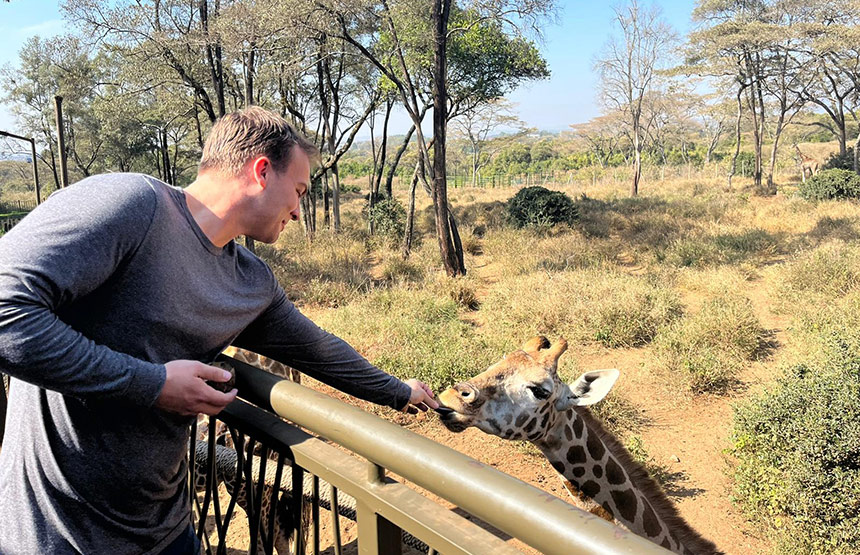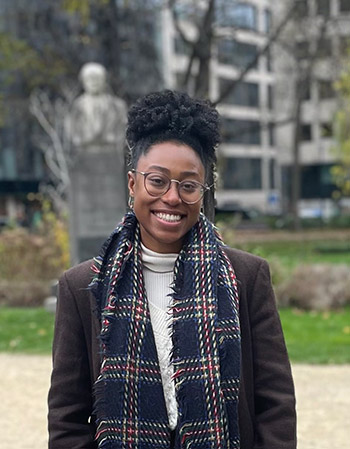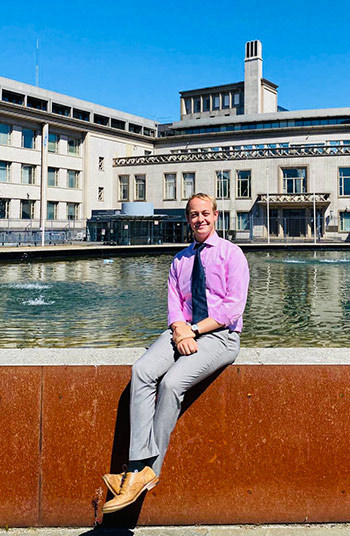
By Andrew Cohen
Kenya may be more than 9,500 miles from Berkeley, but Brock Williams ’23 has found a purpose there that hits close to home.
One of 106 Berkeley Law students participating in the school’s Field Placement Program this semester — the highest total in Director Sue Schechter’s 16 years at the school — Williams is working with the United Nations Environment Program Law Division in Nairobi, Kenya’s capital.
“The United Nations, and what it aspires to, has long inspired me,” Williams says. “ I was excited by the opportunity to work with this organization, and especially excited to work on some of the environmental agreements that I had only learned about in class.”
The Field Placement Program gives Berkeley Law students a chance to extend their education outside the classroom while receiving academic credit by interning at a nonprofit or government agency and doing legal work directly supervised by an attorney. Students embark on these placements full- or part-time in the San Francisco Bay Area, around the country, and across the world.
Interested in gaining international environmental law experience, Williams emailed the U.N. agency’s acting director and the assistant to the law division’s director during his first year of law school. He kept in contact, received the offer, and Schechter worked with him and the U.N. to make the opportunity a reality.
Tackling numerous projects in both international and national law, Williams’ projects have ranged from recognition of the rights of nature, to recommendations for avoiding and mitigating space debris pollution, to efforts supporting multilateral environmental agreements. He has also participated in and helped organize meetings attended by delegates from around the world.
“I am extremely grateful,” says Williams, who lives in a pool house cottage and walks less than a mile to his office. “In addition to the work itself, one of the most rewarding experiences has been the city of Nairobi. People from around the world live here and I’ve been excited to interact with so many different cultures, to see animals that I had previously only seen in zoos, and to experience Nairobi’s amazing culinary offerings.”
Serendipity strikes
While Quincy Blair ’23 has largely focused on the American incarceration system at Berkeley Law, she’s long been interested in exploring international human rights. After talking with students about their abroad field placements, she figured it would be a great chance to learn through experience while exploring different cultures, languages, and ways of life outside the U.S.
After stumbling across a report about prison conditions in Italy that was conducted in part by the nonprofit No Peace Without Justice, she cold-emailed the organization — which led to an interview, a written evaluation, and eventually an offer.

“I explained to them that I spoke Italian because I studied abroad in Italy during undergrad,” Blair says. “They said they had an office in Brussels with many Italian speakers so that I could practice the language in the office, but also be closer to all of the events that happen at the European Parliament.”
No Peace Without Justice works to protect and promote human rights, democracy, and the rule of law and international justice. Its advocacy efforts include raising awareness and fostering public debate through political campaigns, implementing various programs, and fostering partnerships between non-governmental organizations and other societal actors.
Blair’s work includes helping to run social media accounts on ecocide in the Amazon region, publishing daily news reports to the organization’s website, running a biweekly news radio show in Italian, and searching for grants. She also makes reports on relevant meetings at the European Parliament that include issues of violence against women, and helped her organization run a side event there where it invited Indigenous leaders from Brazil to speak about harmful effects of the climate crisis and exploitation of natural resources in the Amazon region.
“As for my legal tasks, I’m working on a long-term research project on sovereign immunities in regards to the Russian-Ukrainian war that will be turned into some advocacy efforts,” Blair says. “While I have an intern supervisor who manages my assignments and a legal supervisor to whom I can ask all of my legal questions, the organization prides itself on having a horizontal chain of command. That is to say that any meeting that I attend, I’ve been encouraged to share my thoughts and ideas about the issue at hand.”
There are challenges, of course. Belgium’s primary languages are French and Dutch and Blair speaks neither, leading to some time in grocery stores using Google Translate or gesturing wildly with people who don’t speak English or Italian.
“But I love having the ability to take quick weekend trips to foreign countries at such affordable prices,” says Blair, who so far has traveled to the U.K., Morocco, Hungary, and Denmark. “While I don’t necessarily foresee a career in international law, the skills I’m learning I know will be invaluable as a lawyer: how to write persuasive arguments, synthesize complex information in a concise and coherent manner, and use our platforms as lawyers as a tool for advocacy.”
A transformative time
Spencer Perry ’23 came to Berkeley Law after spending years working to reform criminal justice systems, seeking a career advocating for vulnerable communities, holding harm to account, and working to temper zeal with empathy.
“I could think of no better place to practice those principles than here prosecuting war criminals at the International Residual Mechanism for Criminal Tribunals,” he says of his placement in The Hague, Netherlands. “I am deeply grateful to help serve its mission.”

Eager to gain pragmatic experience that will help him become an effective and compelling advocate, Perry pursued the Field Placement Program after talking with classmates who shared positive experiences. His daily tasks include investigating ethnic cleansing operations, preparing prosecution strategies for national governments, and developing legal research resources for war crimes prosecutors elsewhere.
“I work closely with a team of interns from around the world, translators, and case managers who know the U.N. better than the bus map, and attorneys steeped in international law and complex criminal trials,” he says. “I am challenged every day and I feel a deep sense of purpose and fulfillment.”
Perry lives in a small flat outside of The Hague city center with his dog, and bikes to work through the woods and over canals. It’s a powerful contrast from working in an international criminal tribunal that focuses on war crimes prosecution and provides an often jarring education about the deep scars of genocide and how a community heals and addresses its perpetrators.
“It presents a hope that cycles of violence can be broken and evil can be held to account in a courtroom instead of a battlefield,” Perry says. “Genocide is a deeply challenging subject. It is a uniquely motivated campaign of violence that can cast doubt on beliefs in common humanity. More challenging still is working to grow my capacity to support the victimized community. I work hard to understand how diasporas heal and how people like myself can act with holistic empathy despite never being able to fully appreciate their loss and trauma.”
Hoping to bring these experiences to bear in criminal prosecution, Perry says he aims to “continue interrogating assumptions, acting with empathy, and striving for justice. I aspire to find positions where I can support vulnerable communities and seek comprehensive solutions to systematic problems. My short time here has made me a better advocate and a better person.”